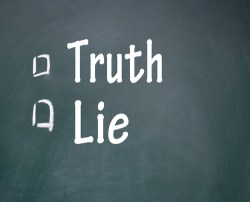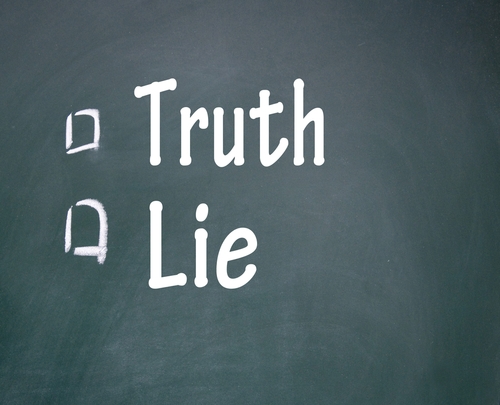
Photo by Shutterstock.
The brazen lies of the Romney/Ryan campaign — on full display in Paul Ryan’s spectacularly dishonest speech at the Republican National Convention — have political pundits at a loss. Here’s Kevin Drum:
I struggle to describe [the attack on Obama’s selectively edited quote “you didn’t build that”]. It’s not worse than past attacks, but it is different. In the past, you felt that maybe campaigns were at least a little bit embarrassed about this kind of thing. They’d blame it on someone else. They’d try to produce some lame defense. They’d haul out some fake white paper to give themselves cover. They’d do something. The Romney campaign just doesn’t seem to care. If it works, they use it. It’s like the campaign is being run by cyborgs.
I dunno. What’s the right word to describe this?
Ooh, ooh, call on me!
The right term is “post-truth politics.” What Kevin is struggling to describe is that Romney’s campaign is not contesting the truth value of its assertions so much as contesting whether truth value itself is relevant.
One effect of the radicalization of the right over the last few decades has been the discovery of just how much our politics is held together by norms rather than rules. There’s no rule you can’t filibuster every bill in the Senate by default; there’s no rule you can’t interrupt a president’s State of the Union; there’s no rule you can’t hold the routine debt-ceiling vote hostage. It simply wasn’t done. But if you shrug off the norm and do it anyway, there’s nothing to stop you.
Similarly, it seems that the lip service given to truth in politics is but a norm itself, one with increasingly tenuous hold. Political campaigns have always lied and stretched the truth, but when caught in a lie, would typically defend themselves (claim it was actually true), retract, or at the very least stop repeating the lie. Either way, the presumption was that truth-telling had some moral force; one ought to tell the truth, even if that commandment was often honored in the breach.
What’s creepy about the Romney crew is that they don’t do any of those things. They don’t deny, they don’t stop, they just don’t care at all. What they’ve realized is that, given today’s hyper-polarization and fragmented media, there’s no practical risk to lying. It doesn’t hurt them, in terms of getting votes, so why shouldn’t they do it?
A couple of years ago, I wrote a post that, as far as I’ve been able to tell, coined the term post-truth politics. I also wrote a couple of follow-ups, here and here. After that, economist Paul Krugman adopted the term and it started bouncing around more and more. In just the past few weeks, it’s really taken off.
(My authorship of the term seems to have been lost to history; such are the wages of being an obscure niche blogger. Thanks to Alec MacGillis, at least, for giving me a shout-out!)
Regardless, I don’t care about ownership, I’m just happy that journalists and pundits are starting to seriously grapple with the issue itself. For some recent thoughts on what the post-truth era means and how to deal with it, see James Fallows of The Atlantic, Michael Scherer of Time, Greg Sargent of The Washington Post, MacGillis and Jonathan Cohn at The New Republic, Ezra Klein at The Washington Post, Josh Marshall at Talking Points Memo, press critic Jay Rosen, and Brendan Nyhan at Columbia Journalism Review.
When I originally wrote about post-truth politics, I was focused on how Obama should operate within it. But most of the recent discussion has been about how journalists should operate within it. They face two basic problems.
David Bernstein of The Boston Phoenix gets at the first in this tweet:
Dear media critics: OK, entire news media called Romney’s welfare attack a lie. Campaign still pushing it. Now what?
Fair question! The political media, at least certain quarters of it, has become more forthright about calling out lies and deceptions lately. (For some reason, the welfare attack in particular has fired them up.) But the Romney campaign doesn’t give a damn. As their pollster said the other day, “we’re not going to let our campaign be dictated by fact checkers.” A key feature of the post-truth political landscape is that there are no longer universally recognized arbiters or referees of fact. The right has their own media ecosystem. Why should they care what journos outside it say?
So what’s a journalist to do when she calls a lie a lie … and then the candidate keeps repeating it? One of the great demands of daily journalism is novelty. Reporters are supposed to write about what happened today, what’s new. Pundits and analysts hate debunking the same lie over and over again; it bores them and their readers. But if a candidate or campaign just bulls through the initial round of scolding and keeps on telling the lie, what then? The whole enterprise can seem futile, especially when none of it seems to reach or budge undecided voters.
So that’s one problem. The other one is well-captured by Ezra Klein’s tortured admission yesterday that, after trying and trying to be even-handed with Ryan, he has to admit: His speech was full of lies! Ezra is extremely concerned with being intellectually honest. He wants people in D.C., even people he disagrees with, to know that he’ll treat them fairly and engage their best arguments. (It’s not shtick, either — he’s really like that!) But an honest appraisal of the Romney/Ryan campaign is what it is:
Quite simply, the Romney campaign isn’t adhering to the minimum standards required for a real policy conversation. …
I don’t like that conclusion. It doesn’t look “fair” when you say that. We’ve been conditioned to want to give both sides relatively equal praise and blame, and the fact of the matter is, I would like to give both sides relatively equal praise and blame. I’d personally feel better if our coverage didn’t look so lopsided. But first the campaigns have to be relatively equal. So far in this campaign, you can look fair, or you can be fair, but you can’t be both. [my emphasis]
That’s the root of it: Campaign reporters have deeply internalized the need to appear fair, to be above mere partisanship, to criticize or praise both sides in equal measure. The GOP is acutely aware of this dynamic and for years has used it to their advantage. But real fairness is geared to the facts, not to appearances, and today’s right simply lies more, misleads more, and denies established facts more. That is the conclusion a fair-minded appraisal yields. Empirics have a liberal bias, to paraphrase Colbert.
So what do journos do? Do they call them as they see them and get labeled “biased” and “partisan”? Or do they follow the lead of The Washington Post‘s The Fix and cover politics like a theater critic assessing performances? That’s been the default mode for Politico-style journalists (like, say, Mark Halperin) for a long time. It’s safe and comfortable. There’s rarely any penalty for getting things wrong. You can rise quite high among the ranks of Very Serious People in that mode. But for those like Ezra, rankled by facts, irritated by conscience, it’s not a very attractive route.
I don’t have a good answer. But I might as well share my experience/perspective, for what it’s worth (very little).
It won’t come as a surprise to anyone that I have no training in journalism. I was never taught to be even-handed or “neutral.” What training I have for what I do came from two places. The first was a whole lot of time spent with a large extended family in the South (Georgia, mostly) filled with raucous, hyper-verbal drunks with highly sensitive bullsh*t detectors and razor-sharp senses of humor. The second was grad school in philosophy.
In both places, I learned to love arguing, the mechanics of stringing facts and evidence together to reach conclusions. But I also learned that in real-life situations, the technically superior argument does not always carry the day. In real-life situations, the one that wins is the one with wit and timing, the one with the ability to employ mockery, flattery, flirting, storytelling, peer pressure, guile, and the whole array of other non-factual, non-logical communicative tools available to the human animal.
Traditional journalism, particularly in its post-war American variety, has purposefully denuded itself of most of those tools. The idea is “just the facts.” That can inform an argument, but it can’t win one. Journalists do not like to think of themselves as in an argument, as competing with, say, a campaign to convince the public of something. They still think of themselves as neutral arbiters of truth. But neither the campaigns nor the public view them that way any more.
What would it look like if journalists tried to win an argument with a campaign — an argument over, say, what Obama has done with state welfare waivers? For one thing, they wouldn’t just string together correct facts once and call it good. They would do it repeatedly. They would call out the campaign explicitly as acting in bad faith. They would mock and shame the campaign for its behavior.
This would be a serious departure for U.S. journalists. It would put them in an explicitly adversarial role with political operators — not the same operators all the time, not the same party every time, maybe, but not “neutral.” More like prosecutors working on behalf of the truth.
Let’s be real, though: Journalists fear making those kinds of choices for good reason. It’s absolutely verboten for a Very Serious Person in D.C. to behave this way. They rightly sense that it will limit their careers and their access to the halls of power. As a person of, ahem, modest ambition, I don’t mind all that much. But for ambitious journos in D.C., there are real perils to calling a spade a spade.
So what’s the answer? Lemme know what you think.



